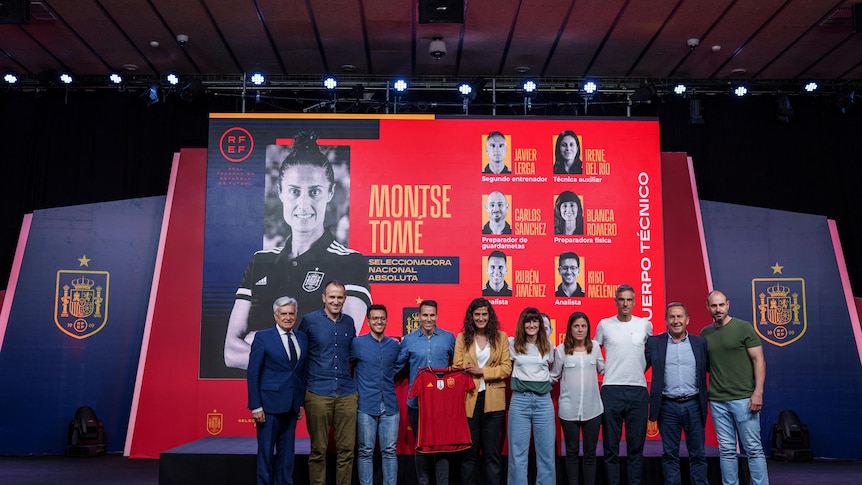
Most of Spain’s World Cup-winning players have ended their boycott of the women’s national team, after the government intervened to help shape an agreement that was expected to lead to immediate structural changes at the country’s soccer federation.
Key points:
- The two players who left would be later revealed by the federation
- Interim president Pedro Rocha was asked to step down by the players
- It is unclear if any firings would take place in the federation
Early on Wednesday (local time), a majority of the players stayed at the team’s training camp after being told that some of their demands for reform would be met.
Only two players, who had not been immediately named, opted to leave the team’s training camp after receiving guarantees from the government they would not be sanctioned.
On Tuesday, players reported to camp after being picked by new coach Montse Tomé against their will.
The players were chosen on Monday, in the latest twist in the crisis that engulfed Spanish soccer after former federation president Luis Rubiales kissed player Jenni Hermoso on the lips during the awards ceremony following Spain’s Women’s World Cup title in Australia last month.
Specific details of the changes agreed upon were not revealed following the hours-long meetings involving the government’s top sports official, players, Tomé and federation officials.
The meetings ended at nearly 5am local time (1pm AEST) on Wednesday.
Spain’s secretary for sports and president of the Higher Council for Sports, Víctor Francos, said the “cordial meetings” led to the creation of a committee involving players, the federation and the government.
He said the agreements should promote advances in gender policies and equal pay, as well as lead to structural changes in women’s soccer.
It was not clear, though, if any firings would take place in the federation.
Among the demands by the players was to have interim president Pedro Rocha, who took over after Rubiales’s resignation, to also step down.
Francos said that the names of the two players who decided to leave would be later revealed by the federation.
“They asked to leave the camp because they were not motivated and did not feel comfortable,” Francos said.
“I hope that they will be respected just as the other players who decided to stay.”
Officials said the players did not call for new coach Tomé to step down.
Tomé was an assistant to former coach Jorge Vilda at the World Cup, replacing him after he was fired.
On Monday, Tomé picked nearly half of the 39 players who said they would not play for the national team until their demands were met, including 15 World Cup-winning players.
Hermoso was not among them as “a way to protect her,” Tomé said.
The player, who said she did not consent to the kiss by Rubiales, had accused the federation of trying to intimidate her teammates by picking them for the national team against their will.
The squad announcement was originally planned for Friday but was postponed because no agreement had been reached with the players.
The players said they were caught by surprise by the squad announcement but showed up to camp because otherwise they risked breaking a Spanish sports law, that requires athletes to answer the call of national teams unless there are circumstances that impede them from playing, such as an injury.
Not responding to a call-up by a national team can expose a player to fines or even being banned from playing for their clubs. Those punishments would have to be requested by the federation to the government’s sports council, which would decide whether to apply them.
The government said after the meetings that it would not seek any punishment for the players who decided to leave.
In 2022, 15 players rebelled against Vilda, asking for a more professional environment.
Tomé included in her first list some of the players who rebelled.
AP/ABC
.